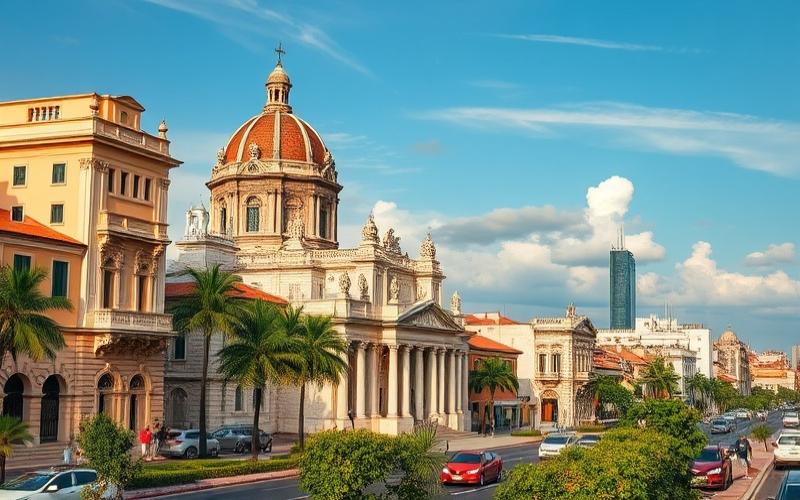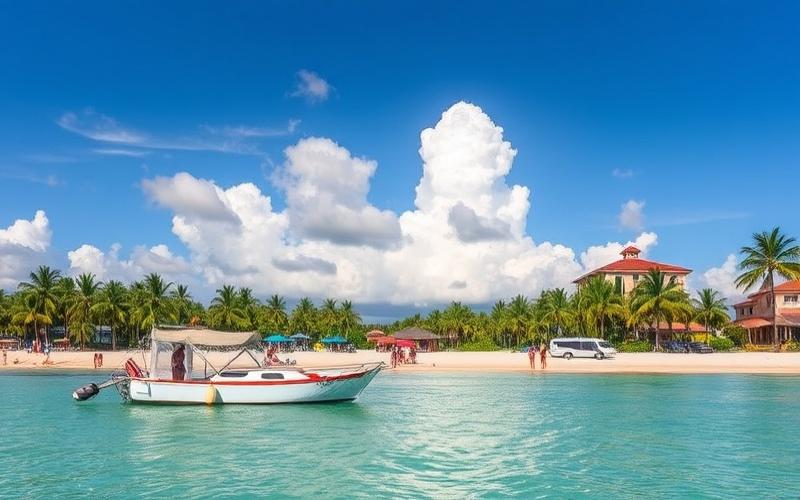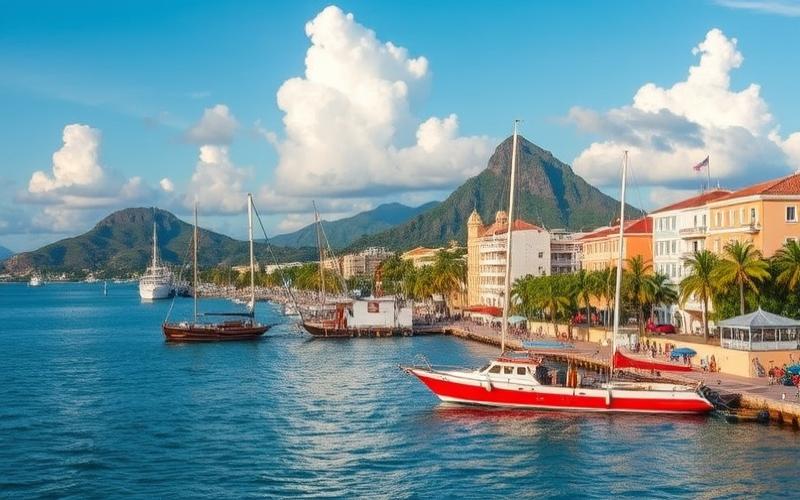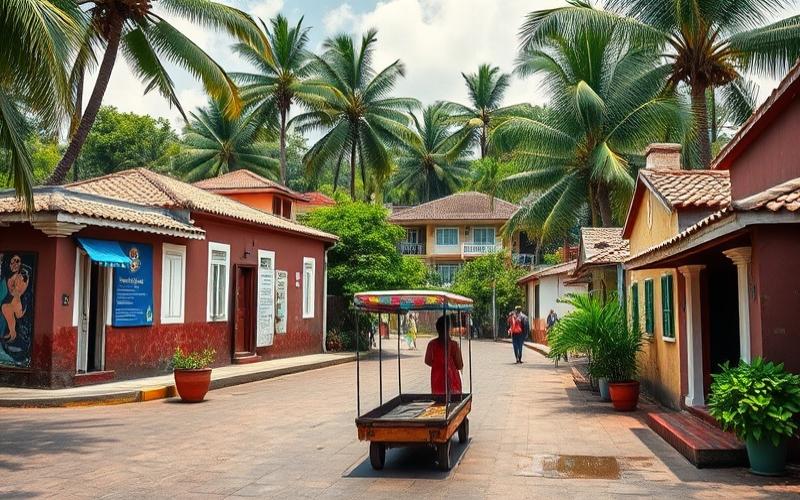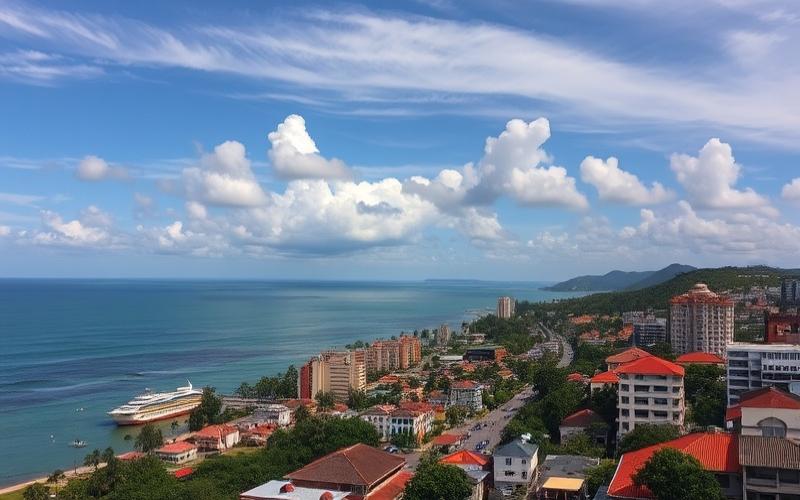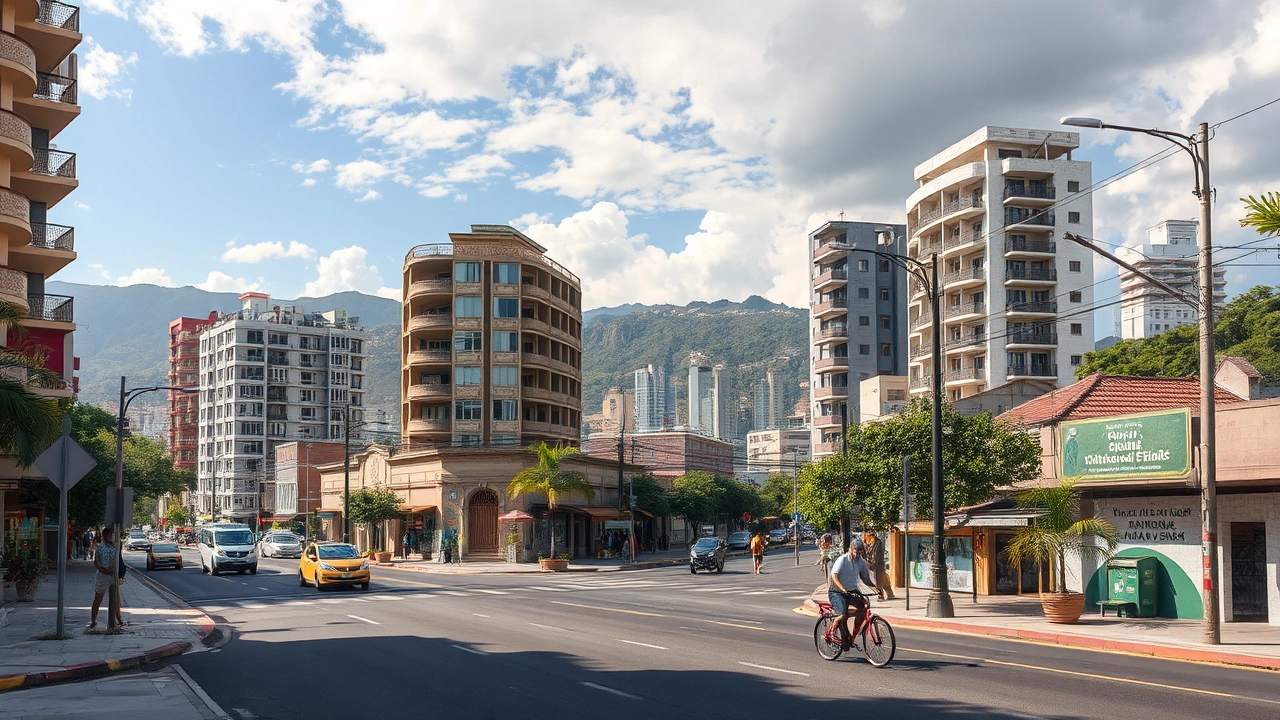
 Published on and written by Cyril Jarnias
Published on and written by Cyril Jarnias
In the dynamic economic context of the Dominican Republic, industrial free zones represent essential opportunities for investors and entrepreneurs seeking profitability and innovation. With attractive tax incentives and a skilled workforce, these zones play a crucial role in the development of the country’s industrial real estate sector.
The growth of this sector shows no signs of slowing down, particularly due to the increasing establishment of international companies attracted by these competitive advantages. This article highlights the free zones not to be missed, offering lucrative prospects for those looking to benefit from the Dominican Republic’s thriving business climate.
Investing in Dominican Republic Logistics Warehouses
Geographic Location Advantages
The Dominican Republic benefits from a strategic position at the crossroads of the Americas and Europe, facilitating regional and international trade. This location provides quick access to major markets, including the United States, Central America, the Caribbean, and Europe. Preferential trade agreements strengthen this openness.
Tax Incentives and Free Zone Benefits
- Full or partial exemption from import/export taxes.
- Tax reductions on profits for companies located in free zones.
- Administrative simplification enhancing logistics competitiveness.
- Easy access to local skilled labor at attractive costs.
Infrastructure Accessibility
The Dominican Republic has modern infrastructure, essential for logistics:
- Several major seaports (Caucedo, Haina) connected to major international trade routes.
- Three major international airports linked to the national road network.
- Potential railway development in certain industrial regions.
Major global operators present: Maersk, CMA CGM, Hapag-Lloyd, and MSC provide a wide range of logistics services tailored to diverse market needs.
Current Industrial Real Estate Market Analysis
| Indicator | Value/Return |
| GDP Growth (2022) | +5.1% |
| Construction/Industry Share | 16% / 11% of GDP |
| FDI Attractiveness | Highest level in the Caribbean |
| Estimated Rental Yields | Between 8% and 10%, depending on projects |
The industrial sector is experiencing sustained growth due to economic diversification. Logistics real estate particularly benefits from the regional e-commerce boom and active policies favoring nearshoring. Modern warehouses are highly sought after by both foreign and local investors.
Potential Challenges: Regulations & Economic Risks
List of main challenges:
- Possible complexity in certain local administrative procedures (specific permits depending on products or sectors).
- Risk related to global economic conditions that could affect foreign trade (imported inflation, currency fluctuations).
- Need for constant adaptation to sometimes evolving tax regulations.
It is advisable to have local support to anticipate any specific regulatory constraints or policy changes impacting the sector.
Concrete Examples & Future Prospects
Notable examples:
- Rapid development of industrial free zones around Santo Domingo/Caucedo; several multinationals have established their regional hubs there to serve all of Latin America.
Prospects:
Investments are expected to continue their growth with ongoing government support for infrastructure modernization. The DR is establishing itself as an essential regional hub, fully benefiting from the global repositioning of logistics chains (“nearshoring”).
The Dominican Republic thus offers an exceptionally favorable environment for investing in logistics warehouses: unique strategic positioning, attractive taxation through its free zones, efficient infrastructure – but requires vigilance regarding local regulatory frameworks and changing macroeconomic contexts.
Good to Know:
Investing in logistics warehouses in the Dominican Republic offers notable advantages thanks to its strategic position at the heart of the Caribbean, facilitating access to American and Latin American markets. The country’s free zones provide attractive tax incentives, including exemptions from customs duties and income taxes. The infrastructure network is robust, with modernized ports, international airports, and a developing road network. The industrial market shows continuous growth, with potential returns reaching up to 6-8% annually. However, it is crucial to consider challenges related to local regulations and economic fluctuations. Success examples include multinational companies establishing regional distribution centers. Growth prospects are encouraging, supported by public investments in infrastructure and increasing demand for efficient logistics solutions.
Free Zones: An Asset for Industrial Real Estate Returns
Free zones constitute a strategic pillar for industrial real estate returns in the Dominican Republic. Their privileged position in the national economy, combined with incentive legislation and modern infrastructure, attracts numerous investors.
Tax Benefits and Economic Incentives:
- Full exemption from taxes on profits generated by export-oriented industrial activities.
- Import of goods without customs duties or value-added tax.
- Absence of property tax for companies established in these zones.
- Access to comprehensive industrial park services (logistics, security, energy).
Notable Examples of Highly Developed Free Zones:
| Free Zone | Location | Number of Companies | Jobs Created | Dominant Sectors |
|---|---|---|---|---|
| La Romana | East | >50 | >10,000 | Textiles, Medical Products |
| San Isidro | Santo Domingo | >40 | >8,000 | Electronics, Software |
| Santiago | North | >60 | >12,000 | Pharmaceuticals, Food Processing |
Recent Economic Impact:
- In 2017, the country had 71 free zones, comprising 665 companies, generating over 165,724 direct jobs.
- Exports from free zones exceeded $6 billion USD in 2018, accounting for over 60% of total national exports.
- Dominant sectors include medical and pharmaceutical manufacturing (24%), apparel (23%), and electrical/electronics (14%).
Thriving Industries in These Zones:
- Medical and Pharmaceutical Products
- Textiles/Apparel
- Electrical and Electronic Equipment
- Software Development & Financial/Logistics Services
These industries benefit from:
- The strategic location at the crossroads of the Americas enabling efficient logistics to North American and European markets.
- Modern industrial infrastructure integrated into parks with direct access to international ports.
Contributions to Industrial Real Estate Returns:
- Strong rental demand for warehouses/industrial workshops meeting international standards.
- Rapid appreciation of real estate assets due to the dynamism of the export sector.
- High occupancy rates favored by sectoral diversity.
Future Prospects:
- Major ongoing projects with planned expansion of the number of free zones (+9% in two years).
- Targeted development towards advanced technology industries and regional logistics centers to meet the continuous growth of foreign trade.
Industrial real estate investments in Dominican free zones thus benefit from an exceptional tax environment, sustained demand driven by industrial diversification, and infrastructure adapted to international standards.
Good to Know:
In the Dominican Republic, free zones play a crucial role in industrial real estate, offering significant tax benefits and economic incentives to attract investors. For example, the San Pedro de Macorís free zone has recorded significant growth, attracting industries in textiles and electronics, which benefit from its strategic location and modernized infrastructure. These zones contribute to increasing real estate investment returns through reduced import duties and exemptions from certain taxes. According to recent reports, free zones represent about 5% of GDP, illustrating their impact on the local industrial real estate market. With ongoing development projects, such as the expansion of the La Vega free zone, future growth prospects remain promising, further strengthening the appeal of industrial real estate.
Strategies for Institutional Investors in Industrial Real Estate
Key Factors to Consider for Evaluating Industrial Real Estate in the Dominican Republic:
- Strategic Location: Proximity to ports, airports, roadways, and logistics centers.
- Infrastructure Quality: Access to electricity, water, telecommunications, and internet.
- Area and Configuration: Adaptability to industrial needs, ceiling height, logistics accessibility.
- Regulation and Legal Security: Stability of the legal framework, clarity of property rights, transparent acquisition procedures.
- Local Growth Potential: Infrastructure development, urban or industrial projects nearby.
- Availability of Skilled Labor and competitive wage costs.
- Tax Incentives and benefits specific to free zones.
| Key Factor | Importance for Institutional Investor |
|---|---|
| Location | Optimizes logistics, reduces transport costs |
| Infrastructure and Services | Ensures smooth operation of industrial activity |
| Legal Security | Limits litigation risks |
| Market Growth and Stability | Maximizes long-term returns |
| Tax Incentives | Reduces operational and investment costs |
Advantages of Industrial Free Zones
- Tax Incentives:
- Exemption from corporate tax.
- Exemption from VAT and customs duties on import of raw materials and equipment.
- Exemptions from local and municipal taxes.
- Logistics Facilities:
- Direct access to transport hubs (ports, airports).
- Dedicated infrastructure: warehouses, distribution platforms.
- Simplified administrative procedures for import/export.
- Other Advantages:
- Trained and available workforce.
- Dynamic industrial ecosystem, cluster effect.
Current Trends in the Dominican Industrial Market
- Sustained growth in foreign investments, particularly in light industry, logistics, and renewable energy sectors.
- Rapid development of free zones thanks to government policies supporting exports and industrialization.
- Increased demand for modern industrial spaces adapted to international logistics and e-commerce.
- Modernization of infrastructure (highways, ports, airports) facilitating regional and global trade.
Growth Opportunities to Maximize Investment Returns
- Invest in industrial parks or logistics warehouses located near major transport routes.
- Target expanding sectors: logistics, agribusiness, renewable energies, assembly of exported goods.
- Leverage tax incentives to reduce initial costs and improve net profitability.
- Participate in public-private partnerships to benefit from government industrial development programs.
Strategies to Mitigate Potential Risks
- Conduct thorough legal due diligence: verify validity of property titles and regulatory compliance.
- Diversify investments across multiple free zones or types of industrial assets.
- Closely monitor regulatory framework evolution: anticipate tax or customs changes.
- Implement flexible contracts to adapt to market evolution and international regulations.
- Utilize insurance against political and commercial risks in international operations.
The attractiveness of Dominican industrial real estate relies on the combination of a growing market, advantageous tax environment, and efficient logistics framework. Rigorous analysis and a risk management strategy are essential to maximize returns and secure institutional investments.
Good to Know:
For institutional investors interested in industrial real estate in the Dominican Republic, several crucial factors must be considered. Free zones offer significant advantages, including attractive tax incentives and logistics facilities, which can optimize operational costs. The Dominican industrial market is experiencing robust growth, with opportunities supported by increasing demand for infrastructure and export capacity. However, to maximize returns, it is essential to monitor current trends and global influences that may affect economic stability and the investment climate. Investors should also develop strategies to mitigate potential risks, such as changes in the regulatory framework or challenges related to international economic fluctuations. A secure engagement may include continuous assessment of local policies and adaptation to regulatory changes to ensure the sustainability of investments.
Disclaimer: The information provided on this website is for informational purposes only and does not constitute financial, legal, or professional advice. We encourage you to consult qualified experts before making any investment, real estate, or expatriation decisions. Although we strive to maintain up-to-date and accurate information, we do not guarantee the completeness, accuracy, or timeliness of the proposed content. As investment and expatriation involve risks, we disclaim any liability for potential losses or damages arising from the use of this site. Your use of this site confirms your acceptance of these terms and your understanding of the associated risks.


